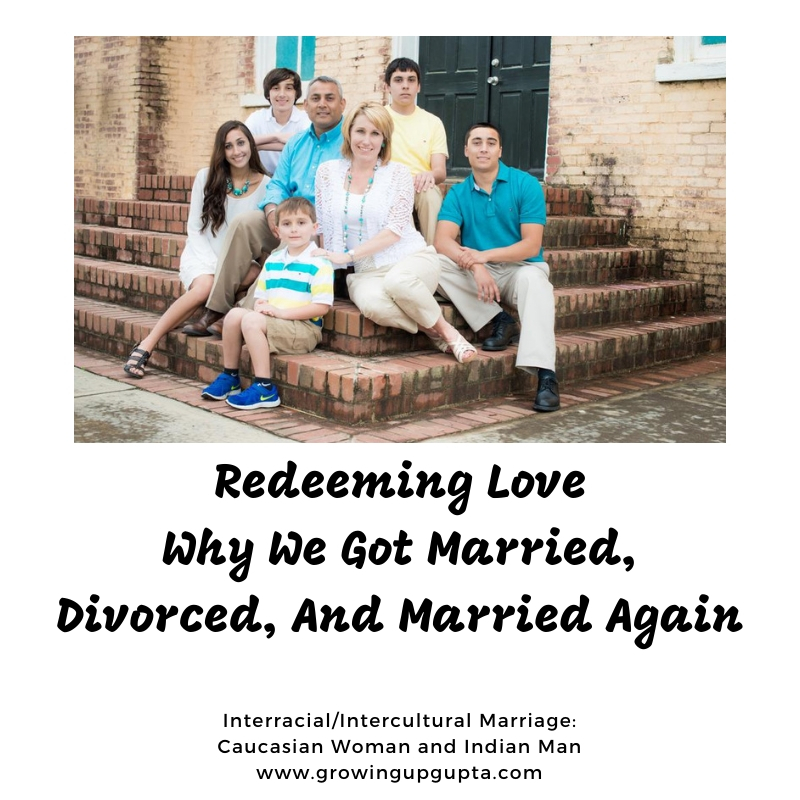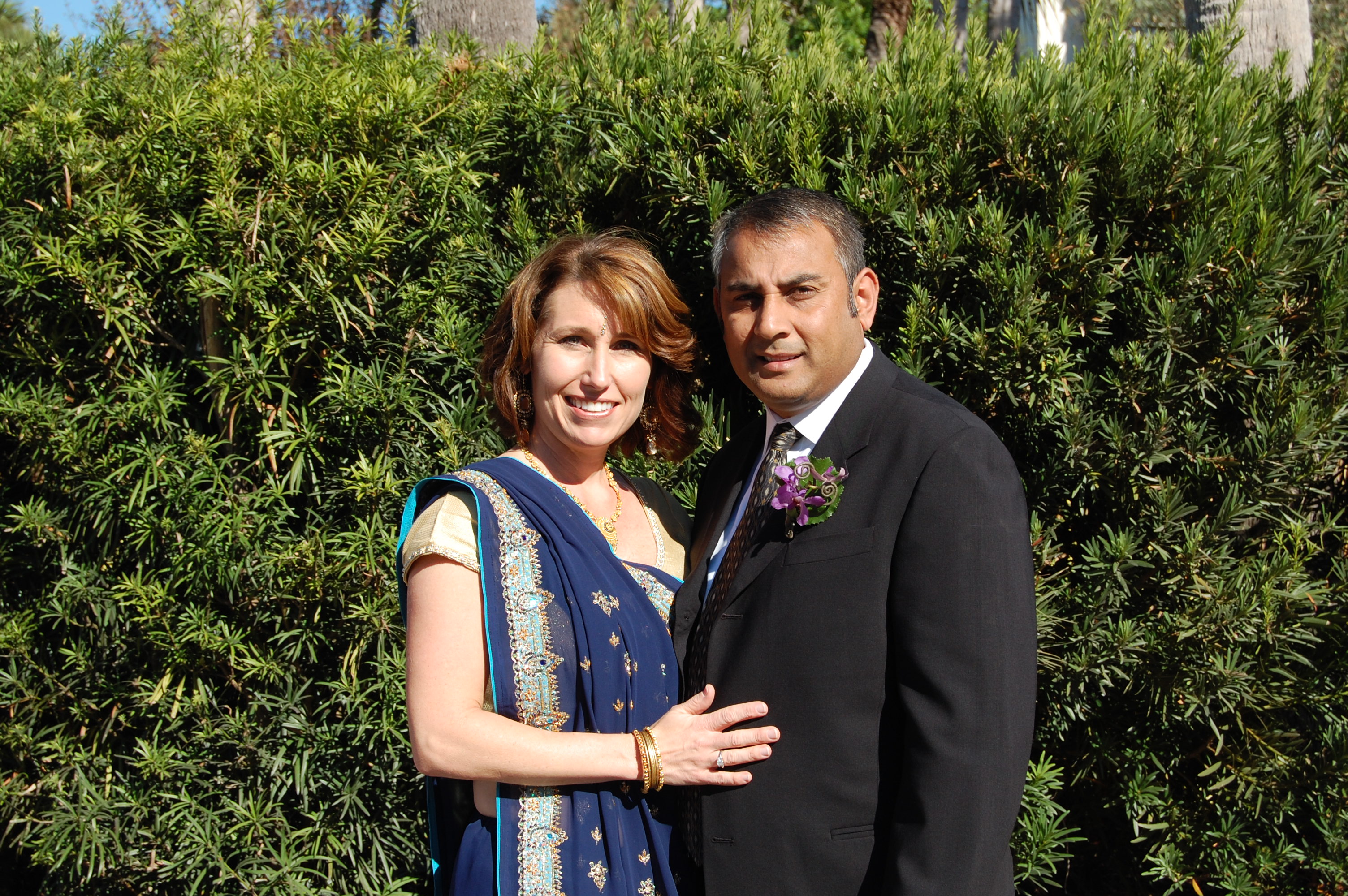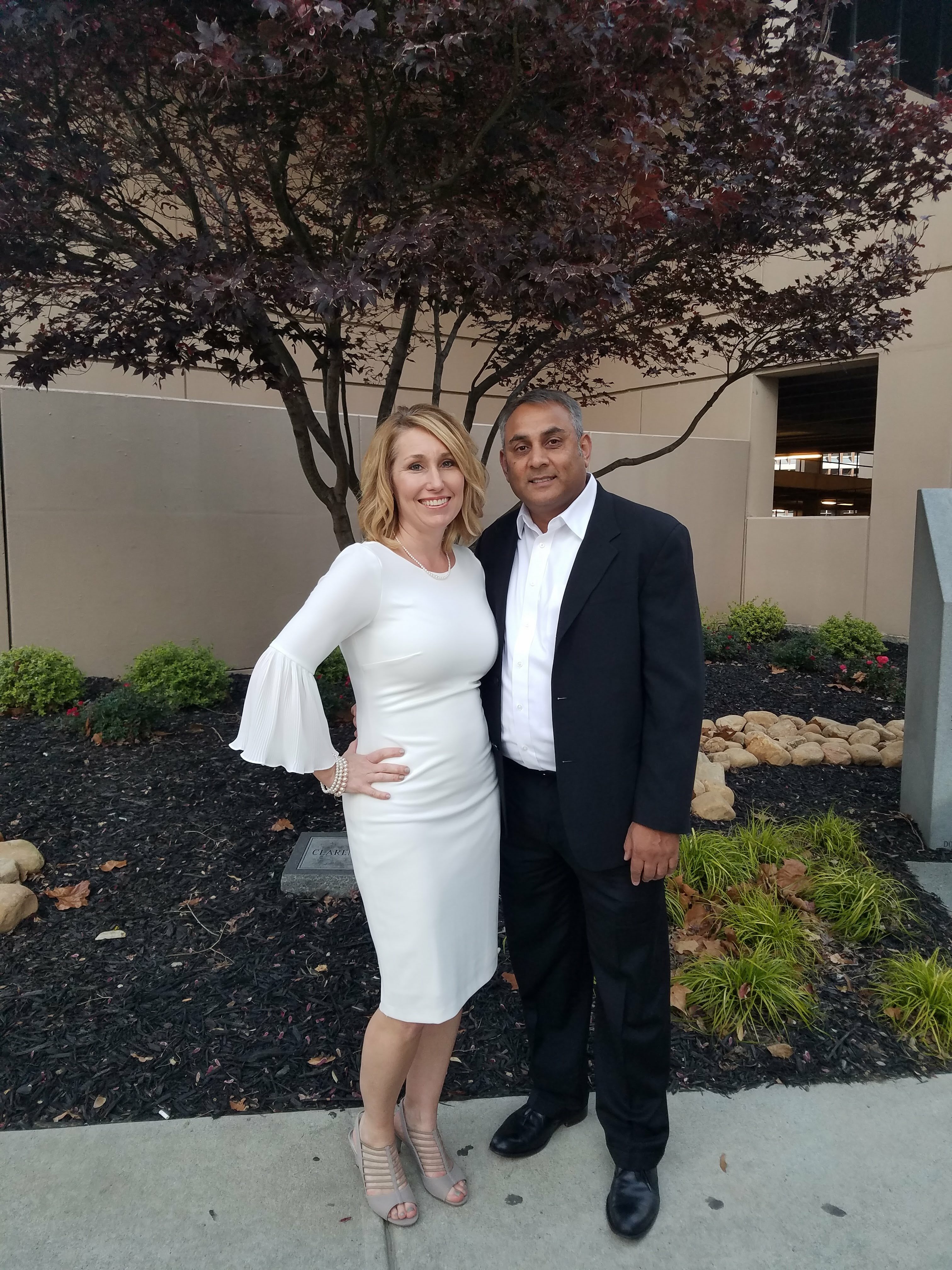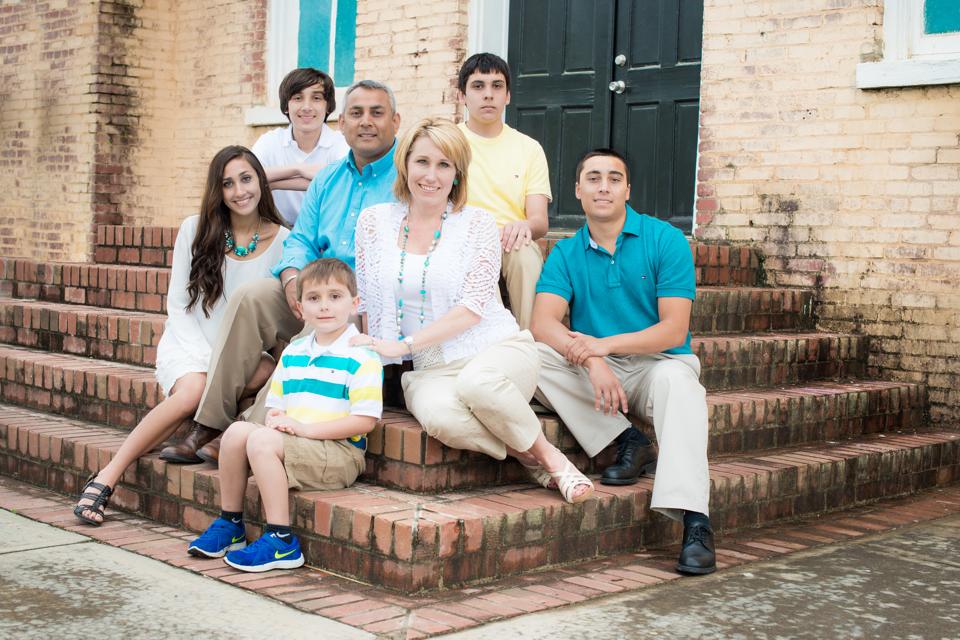
Redeeming Love. Why We Got Married, Divorced, and Married Again.
Redeeming Love. Why We Got Married, Divorced, and Married Again.
An Interview with Sheryl Parbhoo
I connected with author, writer, and podcast creator, Sheryl Parbhoo via social media. We chatted over the phone like fast friends. Immediately her surreal love story caught me off guard, and she agreed to do this intimate and no holds bar interview with me.

Tell me about you and your husband (introduce yourself and your backgrounds, etc.)?
Sheryl: My husband, Dharmesh, and I are an improbable couple. I was born in Nebraska, but my family is from Louisville, Kentucky. We are stock folks of English, Irish, and Scottish descent. Dharmesh is of Gujarati Indian descent. He was born and raised in a segregated South Asian community named Lenasia in Apartheid South Africa.
How long have you been together?
Sheryl: We were married for 24 years before we divorced and remarried each other two years later. In total, we have known each other for 31 years.
Do you have children? If so, how many children do you have?
Sheryl: We have five children together, ages 25, 23, twins who are 19, and a 12-year-old.
How did you meet?
Sheryl: In 1988, I was 16-years-old, working a night shift at a Baskin Robbins near my home. Dharmesh walked in to borrow drink cups for the Baskin Robbins his parents managed. I fell in love at first sight of his exotic looks, jet black hair, warm dark brown eyes. He was so different from any boys I knew and wrote about it in What Happened When I Married into Indian Culture. He, however, loves to point out to the world that it was not love at first sight for him. He even relished sharing it on a BBC program interview we were on. I’m sure you can imagine the daggers I shot him with my eyes across the microphones that day. We were inseparable from our first date.
How was meeting your husband’s parents for the first time?
Sheryl: While dating, we hung out with his buddies and brother a lot. And we stayed far away from his parents and the Gujarati community. He was a handsome young man on track to be a doctor. Having an arranged marriage was the expectation, and my sudden presence on the scene threw a wrench in his family’s plan for him.
Hence the first time I met his parents, I panicked, and I was thrilled at the same time. His mother had me over for a dinner of vegetable biryani, was very warm and friendly, but boy was I taken aback when they both ate with their fingers! This was my first step toward falling into the rabbit hole of Indian culture. I met his father shortly after, who was also very welcoming. Despite that, he and I both knew that they hoped he would break up with me and go the arranged marriage route because it was what they knew and had always wanted for him.
Describe your weddings and provide any tips you have?
Sheryl: We married for the first time in 1992. I am pretty sure that we are in small company with other couples regarding our weddings because we’ve had three. Our first and legal wedding was by a judge, attended by immediate family members only and casual. I still crack up today that his uncles wore tracksuits to the event. He needed instant green card status for student loan eligibility before we could plan an elaborate wedding, so that’s why we did this.
Six months later, we had a big Christian wedding in a church, attended by over two hundred of his family and friends, and roughly fifty of mine. We had a buffet of Indian food straight from the kitchens of Gujarati family and friends, and his parents presented me with a traditional gift of a sari and jewelry. I had always teased him about how uncomfortable he was showing public affection for me around Indians, so on our first dance to an INXS song, I held him close to me the whole time, while he laughed, stiff muscled, and embarrassed about his Ba (grandmother) seeing us so close. His mother didn’t ask us to have an Indian ceremony, which at the time upset me, because I received that as a message of their disapproval of our union. We had a rocky start all around, which eventually led to our divorce.
You mentioned you divorced. What caused the breakdown of the marriage?
Sheryl: We both love each other intensely and believe we are soulmates. We joke that karma is making us pay for things we did to each other in former lives. After five children, and 24 years of ups and downs of joyful times with our family and angering times of cultural clashes in our marriage and child-rearing, we divorced.
So many factors went into causing the divorce. Clashes with one another about family boundaries. His parents expected to walk into our house unannounced and have a strong role in our daily lives. On the otherhand, I expected to have the American separateness of house and home like I was raised. His mother and I staged tugs-of-war for his loyalty with food, standing over him, testing him, daring him to eat the other woman’s cooking.
The marriage problems lay in the fundamental differences in the definition of marriage he and I were raised with. I was brought up by parents who fell in love and eloped, who had an affectionate marriage based on their love, independent of my grandparents. He was raised by parents who hadn’t meet until their wedding. And they had a marriage of obligation to family, children, and the community. I wanted a marriage where a man cleaves to his wife as the Bible declares, and he didn’t understand how to make that happen.
What were the warning signs that the marriage was over?
Sheryl: The warning signs boiled for years as we grew apart. My focus was on parenting, and he was concentrating on his career. Inevitably, we just stopped caring what the other felt. We were always best friends but lost the love connection in the mix. We decided to divorce but keep our friendship and share our deep devotion to our children.
What happened after you divorced each other?
Sheryl: While divorced, we both had time to learn who were as individuals. I did some online dating, determined to find a western man who would put me first, and which resulted in some hilarious and ludicrous scenarios. Dating in your forties is a train wreck, and I recommend avoiding it if you can. I also published my debut novel, The Unexpected Daughter, which is a fictional story of an entangled family web between a white woman, an Indian man, and his mother. (Yes, writing fiction was my therapy). I also taught ESL full time and became a different person. He could breathe away from the stress of me and from his family and became a different person, too.
Why did you decide to remarry each other? How did you rekindle the relationship?
Sheryl: He and I remained connected because of our children. And because we had a friendship, though sporadic at times. After I ended a relationship with someone six months after our divorce, Dharmesh and I rekindled our friendship, and then our love. I explore this more in my upcoming memoir. Because of the intricacies of how he still looked out for me, how I still cared about his well-being and how we recognized changes in each other revolve around some extraordinarily crazy circumstances.
As a result, we dated in secret for a while because we both finally recognized the need for private space to redevelop our relationship. Over long night phone calls and dates over sushi and drinks, we picked up the pieces of what we loved in our lives together. Together we redefined what culture meant in our family, and left the rest behind. Dharmesh and I remarried each other two years after our divorce. We went to the local county courthouse and took our children out for a hibachi dinner afterward. Remarriage completed the circle we had to make to unite our family once and for all.

What have you learned from being divorced and remarried to each other?
Sheryl: I learned that my husband and I are separate people who need space to do their own thing. I learned that when compromise results in one spouse feeling cheated or unheard, it’s not a compromise. I learned that as a woman, I have the right to use my voice, to be heard, and to permit myself to find joy outside of my marriage and children. And I learned that marriage is a life journey that doesn’t come with a handbook for either spouse. Additionally that we show the best and the worst of ourselves to each other and not to expect perfection in me, my husband, or my family.
What obstacles have you had to overcome due to being in an interracial/intercultural relationship? How did you overcome them?
Sheryl: I have thirty-one years of stories on obstacles! Most symbolic was when, early in our marriage, my husband’s relatives sat me at the children’s table for family meals, because I wasn’t a man and couldn’t be with him, but I wasn’t really one of the women, and couldn’t be with them. My race sort of exiled me from the family structure, and I begged him to stand up for me. Eventually, he did keep me by his side, and we distanced ourselves from the Indian community, which was painful for him. My family welcomed him with open arms but didn’t understand his family’s way of doing things, so that was awkward. Nonetheless, as we all got older and wiser, we all grew to see, we are family, and that’s all that matters. My father-in-law and late dad became good friends, and my mom and mother-in-law shop together all the time now.
What are you still learning from being in an interracial/intercultural marriage?
Sheryl: I hate to say I know it all by now, but I feel like I’ve learned enough. We love each other for all the good, bad, different, and shared values. Race and culture are not an issue anymore because, well, we’ve put ourselves through the wringer over it all. Except that my husband and my kids make fun of me because of how fast I burn in the sun, and they get more beautifully golden. Laughter cures all in our family.
What multicultural parenting tips do you have to share?
Sheryl: First and foremost, begin talking with your children immediately about race, culture, and family. Children learn who they are by watching their parents and asking questions. In all things, whether it be about why is mommy white and daddy is brown or where do babies come from, honesty and openness are essential for children’s well-being and identity. When interracial and intercultural children are secure at home, they are equipped to handle dialogue about their background in the outside world. My final tip is to teach and show your children that each side of the family is valuable and equal. My son’s friend once told him his paternal grandmother wasn’t going to heaven because she wasn’t Christian. Boy, that infuriated me. But he was repeating the lessons from beliefs he was being taught at home; to each his own. Teach your children about both religions and cultures and love their grandparents in that fullness. They will decide how to live their own lives as adults with all the love you’ve equipped them with.
Anything else you would like to add?
Sheryl: Yes! In all things in life, finding your tribe to confide in and share support with is essential to happiness. I didn’t know anyone else in my kind of marriage and family for years, and it was lonely. Yet, now that I have connected with people like me all over the world through my writing and podcast. I feel so much comfort. Connect with others, not to gripe, but to lift each other up in your journey.
What did you think of Sheryl’s shocking, emotional, and redeeming love story? Thank you Sheryl for your candor and advice. I look forward to reading your memoir in 2020. Check out Sheryl’s gut-wrenching book, the Unexpected Daughter (linked below)! And Happy Diwali to everyone celebrating!
Pin this post for later!

Are you following us on Growing Up Gupta yet? Find us on Instagram and Pinterest @growingupguptas, on Facebook @growingupguptatheblog and @growingupguptas, and on Twitter @growingupgupta!

About Sheryl:
Sheryl Parbhoo is a southern author, podcaster, former teacher, wife, and mother of five who lives outside Atlanta.
She hosts the weekly podcast Southern Life Indian Wife which shares the title of her upcoming memoir.
Her writing has been featured in Twins Magazine and Masalamommas Magazine, and she has been interviewed on BBC World News’ The Food Chain documentary and PBSNewshour. Her 2016 debut novel, The Unexpected Daughter, was featured in the 2018 Southern Independent Booksellers Alliance Trio Live project, and her intercultural love story memoir Southern Life Indian Wife will be released in 2020.
Coffee is her very best friend. She divides her time between her family, writing, podcasting, and travel. No matter where she is in the world, you can usually find her at Starbucks writing with a triple espresso latte in her hand.
For podcast news, updates about her memoir release, and pictures of her dogs, follow her on Instagram, Facebook, and Twitter and sign up for her newsletter at sherylparbhoo.com. Subscribe to the Southern Life Indian Wife podcast on Apple Podcasts, Google Podcasts, Stitcher, Tunein, Spotify – wherever you listen to podcasts.
This blog post contains afflilate links that support the operation of this blog!


1 comment found